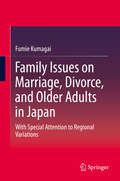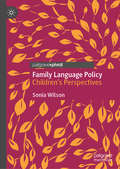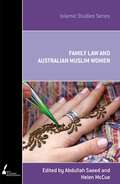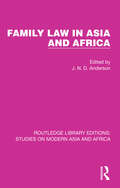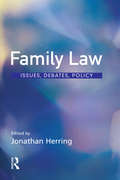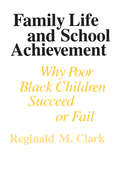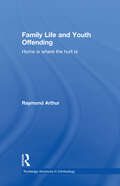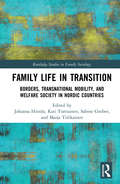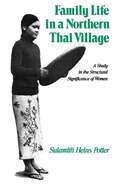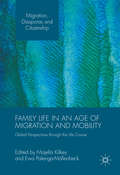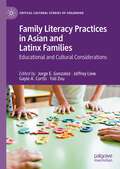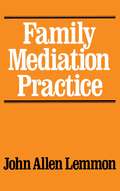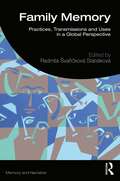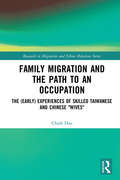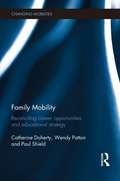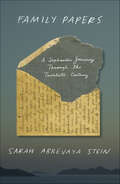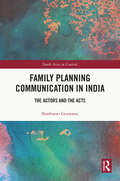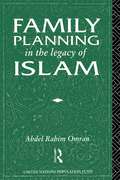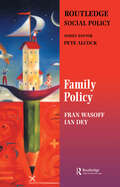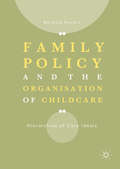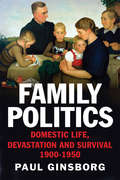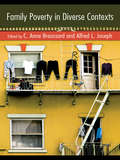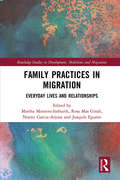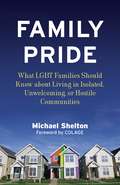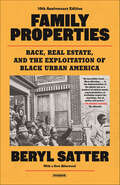- Table View
- List View
Family Issues on Marriage, Divorce, and Older Adults in Japan
by Fumie KumagaiThis book provides insightful sociological analyses of Japanese demography and families, paying attention not only to national average data, but also to regional variations and community level analyses. In analyzing Japanese family issues such as demographic changes, courtship and marriage, international marriage, divorce, late-life divorce, and the elderly living alone, this book emphasizes the significance of two theoretical frameworks: the dual structure and regional variations of the community network in Japan. By emphasizing the extensive cultural diversity from one region to another, this book represents a paradigm shift from former studies of Japanese families, which relied mostly on national average data. The method of analysis adopted in the study is qualitative, with a historical perspective. The book is thus an invitation to more in-depth, qualitative dialogue in the field of family sociology in Japan. This book will be of great interest not only to Asian scholars, but also to other specialists in comparative family studies around the world.
Family Language Policy: Children’s Perspectives
by Sonia WilsonThis book explores the question of family language policy in multilingual households. Presenting six case studies which focus on the experiences of parents and children in French-English bilingual contexts, the author draws conclusions about the impact of parental language management on the family as a whole which can be applied to transnational families from other linguistic backgrounds. While many parental guides on bilingual childrearing have been published in recent years, little attention has been paid to the possible impact of such language strategies on the experiences and interrelationships of bilingual family members. This book is unique in focusing in depth on the psychology and experiences of the child, and it will be of interest to readers in fields as diverse as sociolinguistics, language policy and planning, sociology of youth and family, and child psychology.
Family Law and Australian Muslim Women (Islamic Studies Series)
by Dr Helen McCue Professor Abdullah SaeedThis book is a collection of essays that aims to identify the multitude of ways in which Australian Muslim women negotiate both Australian Family Law and Islamic Family Law in the key areas of marriage, divorce, child custody, property settlement and inheritance. The book also seeks to provide a timely and significant insight into the carious legal, cultural and social processes that Australian Muslim women use when disputes in these key areas arise. Islamic Studies Series - Volume 15
Family Law in Asia and Africa (Studies on Modern Asia and Africa)
by J. N. D. AndersonOriginally published in 1968, we were witnessing a new – and welcome – emphasis on Comparative Law, both in the Universities and even the practising profession, together with a quickened interest in the law of family relations. This volume provided a wealth of information for anyone wishing to study these relations in a widely comparative context. The chapters cover not only the basic law of marriage and divorce in a number of developing countries both in Asia and Africa, but also discuss in considerable detail the ways in which matrimonial property is regulated under different systems. This was a highly topical subject at the time, when our own law of matrimonial property was under criticism and active reconsideration. The book also treats such subjects as the eclipse of the patriarchal family in contemporary Islamic law, religious law and the modern family in Israel, the juristic basis and context of Parsi family law, and contemporary family law in Southern Africa.
Family Law: Family Law (Beginning The Law Ser.)
by Jonathan HerringThis book provides a stimulating, carefully planned introduction to the key issues and debates within family law from some of the leading authorities within their field. It is designed both as a self standing book focusing on the key issues in the subject, and as a supplement to more detailed textbooks on the subject. It is essential reading for anybody studying or practising in the field of family law. Each chapter is concerned with one of the main areas of family law (such as adoption, domestic violence, marrriage and divorce), and covers a range of themes, including the public/private divide, balancing the interests of family members, moral values and family law, cost and the legal system, and the enforcement of family law. The book reflects the interdisciplinary nature of the debates on family law, and the difficult social and political issues which these have raised.
Family Life and School Achievement: Why Poor Black Children Succeed or Fail
by Reginald M. ClarkWorking mothers, broken homes, poverty, racial or ethnic background, poorly educated parents--these are the usual reasons given for the academic problems of poor urban children. Reginald M. Clark contends, however, that such structural characteristics of families neither predict nor explain the wide variation in academic achievement among children. He emphasizes instead the total family life, stating that the most important indicators of academic potential are embedded in family culture. To support his contentions, Clark offers ten intimate portraits of Black families in Chicago. Visiting the homes of poor one- and two-parent families of high and low achievers, Clark made detailed observations on the quality of home life, noting how family habits and interactions affect school success and what characteristics of family life provide children with "school survival skills," a complex of behaviors, attitudes, and knowledge that are the essential elements in academic success. Clark's conclusions lead to exciting implications for educational policy. If school achievement is not dependent on family structure or income, parents can learn to inculcate school survival skills in their children. Clark offers specific suggestions and strategies for use by teachers, parents, school administrators, and social service policy makers, but his work will also find an audience in urban anthropology, family studies, and Black studies.
Family Life and Youth Offending: Home is Where the Hurt is (Routledge Advances in Criminology)
by Raymond ArthurThe contention that young people commit offences due to inadequate parenting and parental difficulties has been an abiding feature of the debates on juvenile offending. Previously this evidence has been used to design prevention programmes for young offenders who have been processed by the criminal justice system, but this book examines how this evidence can be used to prevent offending in the first place. Examining the relationship between the causes of youth offending and the legal duty of the state to address those causes, this book provides evidence to show that improving the family environment could be the most effective and enduring strategy for combating juvenile delinquency and associated behavioural, social and emotional problems. It examines how current child welfare legislation, in particular the Children Act 1989, could be employed to prevent children who are at risk of engaging in antisocial and delinquent behaviour from offending. It abandons the traditional ‘welfare vs. justice’ dichotomy and instead outlines a new approach which focuses on the rights and needs of young people in troubled circumstances and their families.
Family Life in Transition: Borders, Transnational Mobility, and Welfare Society in Nordic Countries (Routledge Studies in Family Sociology)
by Marja Tiilikainen Johanna Hiitola Kati Turtiainen Sabine GruberThis volume examines the ways in which bordering practices influence the everyday lives of racialized parents in the changing welfare states of Finland, Denmark, Norway, and Sweden. Focusing on the need to negotiate, adjust, and reconcile family life, parenthood and parenting practices in the face of national, material, ideological, cultural, religious, and moral borders, it considers the manner in which these processes are complicated by recent changes in the legitimation of Nordic welfare states. The case studies centre on migrant, refugee, and asylum seeker parents, as well as parents of the indigenous Sámi communities. The book considers the ways in which the welfare state and its services construct borders of respectable parenthood, and examines the efforts on the part of racialized parents to negotiate such borders and organize their transnational everyday lives. Uncovering possibilities and obstacles that exist for families seeking to enact citizenship in the Nordic welfare states, Family Life in Transition will appeal to social scientists with interests in the sociology of the family, children, parenting, and the welfare state.
Family Life in a Northern Thai Village: A Study in the Structural Significance of Women
by Sulamith Heins Potter"Potter's 'humanistic narrative' probes family social structure and social organization in Chiangmai, a Northern Thai village .... a solid, informative, and very interesting and alive picture."--Library Journal "Gives us a rare inside view of daily life in a northern Thai village . . . The reader gets a feeling of life, pleasure,jealously,anger, pain, and death that is seldom discussed in the anthropological literature."--Asia "Rejecting the traditional 'loosely structured' theory of the Thai family, Potter suggests a system that is female--centered with structurally significant consanguineal ties between women rather than men. This alternative not only explains the data presented but offers a new way of looking at comparative kinship." --Intercom "The dynamic interplay between the structural dominance of women and the ideological dominance of men is vividly brought out, challenging earlier, and possibly male-biased, perspectives on Northern Thai family structure."--Population and Development Review "Potter succeeds in presenting ethnographic material in a lively, humanistically oriented manner. By the time we have encountered three generations of Plenitudes at home in their courtyard . . . we know them as individuals as we as representatives of an exotic culture. . . . Potter presents individual portraits alongside this vivid picture of family and social structure, communal and individual economic activity, political factionalism, and religious observance . . . this book stands as a challenge to cross-cultural psychology."--Contemporary Psychology "Dr. Potter's study is highly readable and will be of interest to the general public as well as to scholars."--Asian Student
Family Life in an Age of Migration and Mobility
by Majella Kilkey Ewa Palenga-MöllenbeckIn an age of migration and mobility many aspects of contemporary family life - from biological reproduction to marriage, from child-rearing to care of the elderly - take place against a backdrop of intensified movement across a range of spatial scales from the global to the local. This insightful book analyzes the opportunities and challenges this poses for families and for academic, empirical and policy understandings of 'the family' on a global level, including case studies from Europe, India, the Philippines, South Korea, the United States and Australia. With chapters on international reproductive tourism, transnational parenting, 'mail-order brides' and 'sunset migration', it examines the implications of migration and mobility for families at different stages of the life course. Moreover, it brings together leading international scholars to connect a fragmented field of research, and in so doing enables an interdisciplinary exchange, generating new insights for theory, policy and empirical analysis.
Family Literacy Practices in Asian and Latinx Families: Educational and Cultural Considerations (Critical Cultural Studies of Childhood)
by Jeffrey Liew Gayle A. Curtis Yali Zou Jorge E. GonzalezThis book focuses on the literacy beliefs and practices of parents and children from Asian and Latinx heritage backgrounds. In the US, children from Asian and Latinx immigrant backgrounds represent the largest population of dual language learners in schools. While existing research has paid significant attention to the roles of parenting and the home literacy environment on children's literacy development, relatively little attention has been allocated to immigrant families. Chapters aim to meet the need in the field to understand the roles of culture and immigrant experiences on children's literacy learning and development, including immigrant families' home environments and parents' involvement in literacy-related activities in both English and the parents' native language. As Hispanic/Latinx and Asian American populations grow in the US, this book answers an urgent call for school systems and child and family professionals to be aware of issues in this area and how to address them in culturally responsive ways.
Family Mediation Practice
by John Allen LemmonA helpful guide for all those now mediating family disputes, as well as for those who hope to become family mediators.
Family Memory: Practices, Transmissions and Uses in a Global Perspective (Memory and Narrative)
by Radmila Švaříčková SlabákováIn Family Memory: Practices, Transmissions and Uses in a Global Perspective, researchers from five different continents explore the significance of family memory as an analytical tool and a research concept. Family memory is the most important memory community. This volume illustrates the range and power of family memories, often neglected by memory studies dealing with larger mnemonic entities. This book highlights the potential of family memory research for understanding societies’past and present and the need for a more comprehensive and systematic use of family memories. The contributors explain how family memories can be a valuable resource across a range of settings pertaining to individual and collective identities, national memories, intergenerational transmission processes and migration, transnational and diasporic studies. This volume presents the past, present and future of family memory as a prospective field of memory studies and the role of family memory in intergenerational transmission of social and political values. Family memory of violent events and genocide is also looked at, with discussions of the Armenian Genocide, Russian Revolution and Rwandan Genocide. This book will be an important read for cultural and oral historians; family historians; public historians; researchers in narrative studies, psychology, politics and international studies.
Family Migration and the Path to an Occupation: The (Early) Experiences of Skilled Taiwanese and Chinese ‘Wives’ (Research in Migration and Ethnic Relations Series)
by Chieh HsuThis book sheds light on the invisible early post-arrival period of female family migrants, traditionally considered to be low skilled or professionally quiescent. With attention to the experiences of Chinese and Taiwanese women married to German men, it examines the ways in which the private sphere—marked by intermarriage couple dynamics and native–foreigner relations—constitutes the main locus of women’s socialization in the host country, as interactions with their intimate partners in the family realm shape both their self-conceptions and their employment intentions. Based on interviews with migrant women and their spouses, the author outlines the subject positions that characterize female migrants’ attitudes to external constructs and entering the labor market, showing that female family migrants frequently take on family migrant and wife roles that permeate intimate relationships and impede employment intentions, but also often strive to realign with their pre-departure independent selves and thus regain agency. A study of gender dynamics and labor market entry among newly arrived female migrants, this volume will appeal to scholars of sociology with interests in gender, migration, and work.
Family Mobility: Reconciling Career Opportunities and Educational Strategy (Changing Mobilities)
by Catherine Doherty Wendy Patton Paul ShieldFamily mobility decisions reveal much about how the public and private realms of social life interact and change. This sociological study explores how contemporary families reconcile individual members’ career and education projects within the family unit over time and space, and unpacks the intersubjective constraints on workforce mobility. This Australian mixed methods study sampled Defence Force families and middle class professional families to illustrate how families’ educational projects are necessarily and deeply implicated in issues of workforce mobility and immobility, in complex ways. Defence families move frequently, often absorbing the stresses of moving through ‘viscous’ institutions as private troubles. In contrast, the selective mobility of middle class professional families and their ‘no go zones’ contribute to the public issue of poorly serviced rural communities. Families with different social, material and vocational resources at their disposal are shown to reflexively weigh the benefits and risks associated with moving differently. The book also explore how priorities shift as children move through educational phases. The families’ narratives offer empirical windows on larger social processes, such as the mobility imperative, the gender imbalance in the family’s intersubjective bargains, labour market credentialism, the social construction of place, and the family’s role in the reproduction of class structure.
Family Papers: A Sephardic Journey Through the Twentieth Century
by Sarah Abrevaya SteinNamed one of the best books of 2019 by The Economist and a New York Times Book Review Editors' Choice. A National Jewish Book Award finalist."A superb and touching book about the frailty of ties that hold together places and people." --The New York Times Book ReviewAn award-winning historian shares the true story of a frayed and diasporic Sephardic Jewish family preserved in thousands of lettersFor centuries, the bustling port city of Salonica was home to the sprawling Levy family. As leading publishers and editors, they helped chronicle modernity as it was experienced by Sephardic Jews across the Ottoman Empire. The wars of the twentieth century, however, redrew the borders around them, in the process transforming the Levys from Ottomans to Greeks. Family members soon moved across boundaries and hemispheres, stretching the familial diaspora from Greece to Western Europe, Israel, Brazil, and India. In time, the Holocaust nearly eviscerated the clan, eradicating whole branches of the family tree. In Family Papers, the prizewinning Sephardic historian Sarah Abrevaya Stein uses the family’s correspondence to tell the story of their journey across the arc of a century and the breadth of the globe. They wrote to share grief and to reveal secrets, to propose marriage and to plan for divorce, to maintain connection. They wrote because they were family. And years after they frayed, Stein discovers, what remains solid is the fragile tissue that once held them together: neither blood nor belief, but papers.With meticulous research and care, Stein uses the Levys' letters to tell not only their history, but the history of Sephardic Jews in the twentieth century.
Family Planning Communication in India: The Actors and the Acts (South Asia in Context)
by Shashwati GoswamiThis book is the first systematic study on the historiography of the family planning communication process in India. It traces the history of the development of a highly technical health communication process. It discusses how the discourse on India’s population problem was at the heart of the development dialogue which was being promoted by the British colonial administration. The book examines the role of the censuses and the Five-Year plans in the development of the discussion on the population ‘explosion’ in India. Also, it critically discusses the role of the Ford Foundation’s leadership in institutionalising the communication process in India. The book essentially argues that population control communication enabled the ideas of a homogenised nation, an 'ideal' Indian woman and an ‘ideal’ Indian family. This, in turn, led to the obliteration of cultural, ethnic, geographical and economic specificities of India as a country. The volume will be of great interest to scholars and researchers of public policy, media and communication studies, Indian politics, modern Indian history and South Asian Studies.
Family Planning in the Legacy of Islam
by Professor Abdel Rahim OmranHow has the Islamic view of marriage, family formation and child rearing developed and adapted over the centuries? Is contraception just permitted or actively encouraged? The family is the basic social unit of Islamic society. Even without compelling population pressures, there has been concern with spacing and family planning. This book is the result of a massive research project, gathering fourteen centuries (the seventh to the twentieth) of views on family formation and planning, as expressed by leading Islamic theologians and jurists. The work has been discussed and shaped at each stage by a committee of Islamic experts representing the majority of the Muslim countries.The book provides a much needed source of reference and will be of equal value and interest to professionals in health care and development work and to those working in the academic disciplines of Middle East studies, religion and population studies.
Family Policy (The Gildredge Social Policy Series)
by Ian Dey Fran WasoffFamily Policy focuses on the main family activities that are of concern in social policy and social work. This book explores how families behave and questions the implications for policies and practice. Perceptions of and responses to family 'pathologies' - teenage pregnancies, family breakdown, family poverty and violence - are examined. Core issues in family policy are considered, to help students to understand and evaluate the family policies at the hear of Labour's welfare reforms. This will be a valuable text, particularly for HE students with little previous knowledge of family policy.
Family Policy and the Organisation of Childcare: Hierarchies of Care Ideals
by Borbála KovácsThis book explains and theorises the ways in which family policy instruments come to shape the routine care arrangements of young children. Drawing on interviews with close to a hundred parents from very different walks of life in urban and rural Romania, the book provides a rich account of the care arrangement transitions these parents experience during their children’s first five years of life. The influence of family policies emerges as complex and uneven, affecting childcare decisions both directly and indirectly by contributing to the reproduction and legitimation of age-related hierarchies of care ideals. These cultural artefacts, reflective of both longstanding institutional legacies and recent policy innovations between 2006 and 2015, are the prism through which mothers and fathers from diverse backgrounds view and make decisions about their children’s care. This unique volume will be of interest and value to students and scholars of childcare, its organisation and family policy, specifically in post-socialist contexts.
Family Politics
by Paul GinsborgIn this masterly twentieth-century history, Paul Ginsborg places the family at center stage, a novel perspective from which to examine key moments of revolution and dictatorship. His groundbreaking book spans 1900 to 1950 and encompasses five nation states in the throes of dramatic transition: Russia in revolutionary passage from Empire to Soviet Union; Turkey in transition from Ottoman Empire to modern Republic; Italy, from liberalism to fascism; Spain during the Second Republic and Civil War; and Germany from the failure of the Weimar Republic to the National Socialist state. Ginsborg explores the effects of political upheaval and radical social policies on family life and, in turn, the impact of families on revolutionary change itself. Families, he shows, do not simply experience the effects of political power, but are themselves actors in the historical process. The author brings human and personal elements to the fore with biographical details and individual family histories, along with a fascinating selection of family photographs and portraits. From WWI—an indelible backdrop and imprinting force on the first half of the twentieth century—to post-war dictatorial power and family engineering initiatives, to the conclusion of WWII, this book shines new light on the profound relations among revolution, dictatorship, and family.
Family Poverty in Diverse Contexts
by C. Anne Broussard Alfred L. JosephFamily Poverty in Diverse Contexts addresses the context of poverty in the United States and focuses on poverty issues that family members must confront as they move through the life course. This edited collection provides a unique perspective that draws together macro and micro research about how poverty affects families throughout their lives, increasing risks and reducing opportunities at every stage. Individual chapters emphasize the context of poverty in the United States, then go on to examine specific life cycle stages and what happens when poverty intersects with family concerns. Contributing authors are respected experts in their fields and represent a broad range of disciplines and perspectives including child development, community health, education, family studies, gerontology, disability, public policy, social work and sociology. Family Poverty in Diverse Contexts includes a range of pedagogical features to enhance learning such as exercises and discussions relating to each chapter, which will encourage readers to think critically and apply the knowledge to their own lives. It will interest students, academics and researchers of sociology, family studies, social work and health as well as other related disciplines.
Family Practices in Migration: Everyday Lives and Relationships (Routledge Studies in Development, Mobilities and Migration)
by Martha Montero-SieburthThis book places family at the centre of discussions about migration and migrant life, seeing migrants not as isolated individuals, but as relational beings whose familial connections influence their migration decisions and trajectories. Particularly prioritising the voices of children and young people, the book investigates everyday family practices to illuminate how migrants and their significant others do family, parenting or being a child within a family, both transnationally and locally. Themes covered include undocumented status, unaccompanied children’s asylum seeking, adolescents' "dark sides", second generation return migration, home-making, belonging, nationality/citizenship, peer relations and kinship, and good mothering. The book deploys a wide range of methodological approaches and tools (multi-sited ethnographies, participant observation, interviews and creative methods) to capture the ordinary, spatially extended and interpersonal dynamics of migrant family lives. Drawing on a range of cross-cutting disciplines, geographical areas and diversity of levels and types of experiences on part of the editors and authors, this book will be of interest to researchers across the fields of migration, childhood, youth and family studies.
Family Pride: What LGBT Families Should Know about Navigating Home, School, and Safety in Their Neighborhoods (Queer Ideas/Queer Action #8)
by Michael Shelton Elizabeth CastellanaAn invaluable portrait and roadmap on how to thrive as an LGBT family The overwhelming success of Dan Savage's "It Gets Better" YouTube project aimed at queer youth highlighted that despite the progress made in gay rights, LGBT people are still at high risk of being victimized. While the national focus remains on the mistreatment of gay people in schools, the reality is that LGBT families also face hostility in various settings--professional, recreational, and social. This is especially evident in rural communities, where the majority of LGBT families live, isolated from support networks more commonly found in urban spaces. Family Pride is the first book for queer parents, families, and allies that emphasizes community safety. Drawing on his years as a dedicated community activist and on the experiences of LGBT parents, Michael Shelton offers concrete strategies that LGBT families can use to intervene in and resolve difficult community issues, teach their children resiliency skills, and find safe and respectful programs for their children.
Family Properties: Race, Real Estate, and the Exploitation of Black Urban America
by Beryl SatterPart family story and part urban history, a landmark investigation of segregation and urban decay in Chicago -- and cities across the nationThe "promised land" for thousands of Southern blacks, postwar Chicago quickly became the most segregated city in the North, the site of the nation's worst ghettos and the target of Martin Luther King Jr.'s first campaign beyond the South. In this powerful book, Beryl Satter identifies the true causes of the city's black slums and the ruin of urban neighborhoods throughout the country: not, as some have argued, black pathology, the culture of poverty, or white flight, but a widespread and institutionalized system of legal and financial exploitation. In Satter's riveting account of a city in crisis, unscrupulous lawyers, slumlords, and speculators are pitched against religious reformers, community organizers, and an impassioned attorney who launched a crusade against the profiteers—the author's father, Mark J. Satter. At the heart of the struggle stand the black migrants who, having left the South with its legacy of sharecropping, suddenly find themselves caught in a new kind of debt peonage. Satter shows the interlocking forces at work in their oppression: the discriminatory practices of the banking industry; the federal policies that created the country's shameful "dual housing market"; the economic anxieties that fueled white violence; and the tempting profits to be made by preying on the city's most vulnerable population. Family Properties: Race, Real Estate, and the Exploitation of Black Urban America is a monumental work of history, this tale of racism and real estate, politics and finance, will forever change our understanding of the forces that transformed urban America. "Gripping . . . This painstaking portrayal of the human costs of financial racism is the most important book yet written on the black freedom struggle in the urban North."—David Garrow, The Washington Post
